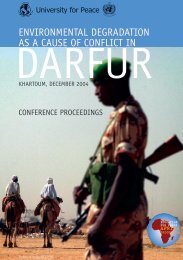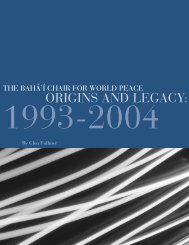who medicines strategy - libdoc.who.int - World Health Organization
who medicines strategy - libdoc.who.int - World Health Organization
who medicines strategy - libdoc.who.int - World Health Organization
Create successful ePaper yourself
Turn your PDF publications into a flip-book with our unique Google optimized e-Paper software.
COMPONENTS OF THE STRATEGY | 43to identify and manage in an ethical manner aconflict of <strong>int</strong>erest that may arise while <strong>int</strong>eractingwith other institutions.The gap between public health and commercialobjectives in the pharmaceutical sector is wellillustrated by the way success is measured with<strong>int</strong>he public health arena and the pharmaceuticalindustry (Figure 7).ProgressWHO has addressed some ethical practices <strong>int</strong>he pharmaceutical sector. These include thedevelopment of ethical criteria for <strong>medicines</strong>promotion and advocating that patents shouldbe managed in an impartial way, protectingthe <strong>int</strong>erests of the patent-holder as well assafeguarding public health principles 14 . WHOhas also advocated responsible practices in thedonation of <strong>medicines</strong> (see also EO 6.7, 7.4).In addition, WHO has initiated a dialoguebetween <strong>int</strong>ernational experts, NGOs, and the<strong>int</strong>ernational pharmaceutical industry in an effortto work together to fight corruption that hindersaccess to medicine in Latin America and theCaribbean. In 2000, the WHO Regional Officefor the Americas and the <strong>World</strong> Bank organizeda workshop on ethical business practices,which addressed the issue of corruption in thepharmaceutical sector.Challenges remainingMany examples of corruption and lack of ethicalpractices in the pharmaceutical arena arereported in the press and in scientific journals 15 .They are also highlighted by organizations suchas Transparency International, a non-profit NGOwhich aims to curb corruption 16 17 .Figure 8 summarizes some of the ethical issuesencountered throughout the <strong>medicines</strong> chain.The results of these unethical practices includereduced quality of health care, shortages ofmedically needed <strong>medicines</strong> and medicalsupplies, unsafe and poor quality products on themarket, financial losses for health care systemsdue to irrational use of <strong>medicines</strong> throughunethical promotion, and the undermining ofpublic trust in science.Meeting the challenges 2004-2007Over the next four years WHO will:> work with countries and partners to identifysuccessful programmes which have tackledcorruption and conflict of <strong>int</strong>erest in thepharmaceutical sector.> based on the results obtained, developa programme for public health officialsto enable them to identify and manageconflict of <strong>int</strong>erest in their <strong>int</strong>eractions withcommercial enterprises and civil societyorganizations (CSOs).OUTCOME INDICATORS1999 2003 2007No. of countries with <strong>medicines</strong> legislation requiringtransparency, accountability and code of conduct forregulatory work> continue to promote the implementation ofethical practices in specific pharmaceuticalsector areas where relevant, relying alsoon guidelines issued by other impartialorganizations.#REPORTING % TARGET#REPORTING % TARGETna na na 84/114 74% 80%











